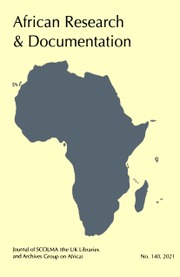No CrossRef data available.
Article contents
Language, heritage, development and identity in South Africa
Published online by Cambridge University Press: 25 April 2022
Extract
This paper is based on a talk given at the British Library in October 2005 to an audience of African publishers and writers. It discusses the crucial role that publishers can play in helping to develop the new, democratic South Africa. My remarks were given from the perspective of the National Heritage Council (NHC) - a statutory, arms-length organisation formed by the National Heritage Council Act passed by the South African parliament in 1999.
In the context of post-apartheid South Africa, the Act mandates the NHC to assist in redressing the racial and ethnic fragmentation of the past. The core function of the NHC is to coordinate all heritage sectors in an interdisciplinary manner. Members of the Council include chairpersons of national heritage institutions as well as representatives of heritage from each of the nine provinces.
- Type
- Articles
- Information
- Copyright
- Copyright © International African Institute 2006
References
1 See Xolela Mangcu, Business Day, 7.11.05.
2 See Kros’, Cynthia Ph D. thesis, ‘Economic, Political and Intellectual Origins of Bantu Education 1926-1951’ University of the Witwatersrand, 1997.Google Scholar
3 Freire, Paulo The Politics of Education (1985)CrossRefGoogle Scholar
4 Educationalist, (not identified) Western Cape Education Department, quoted in Fair Lady, October 2005. For further discussions on mother tongue education see also Boniface Sibayan, P., The Intellectualization of Filipino and Other Essays on Education and Sociolinguistics The Linguistic Society of the Philippines (1999) and (eds) Olson, David R. and Torrance, Nancy, The Making of Literate Societies, Blackwell (2001)Google Scholar
5 The Project for the Study of Alternative Education in South Africa, ‘Towards the Intellectualization of African Languages: A Workshop proposal to Ford Foundation’, prepared by Neville Alexander and David Szanton, n.d. I am grateful to David Szanton for generously making this document available to me. The most articulate and consistent promoter of indigenous languages in South Africa is Neville Alexander, at least four of whose books deal with language, power and nation-building.
6 Alexander and Szanton, draft report of the workshop entitled ‘The Intellectualization of African language: A Workshop sponsored by the Project for Alternative Education in South Africa and the Ford Foundation’, July 2003.
7 Report in The Star, 1.08.2006
8 ‘Motho ke Motho ka Batho’ - a person is a person through other people - is a common proverb throughout southern Africa.
9 In the past, autobiography has provided historians and South African and other readers with personal testimony and a valuable archive of the experiential history of colonialism and apartheid. See for example the autobiographies of the writers of Drum magazine in the 1960s eg Todd Matshikiza, Bloke Modisane, Casey Motsitisi, Can Themba and others. More recently the biographies of struggle heroes such as Nelson Mandela, Walter Sisulu, Oliver Tambo, Ismael Meer, Rusty Bernstein, Joe Slovo and Ruth First and others have been published, as well as the testimonies of cadres in the resistance movement.




